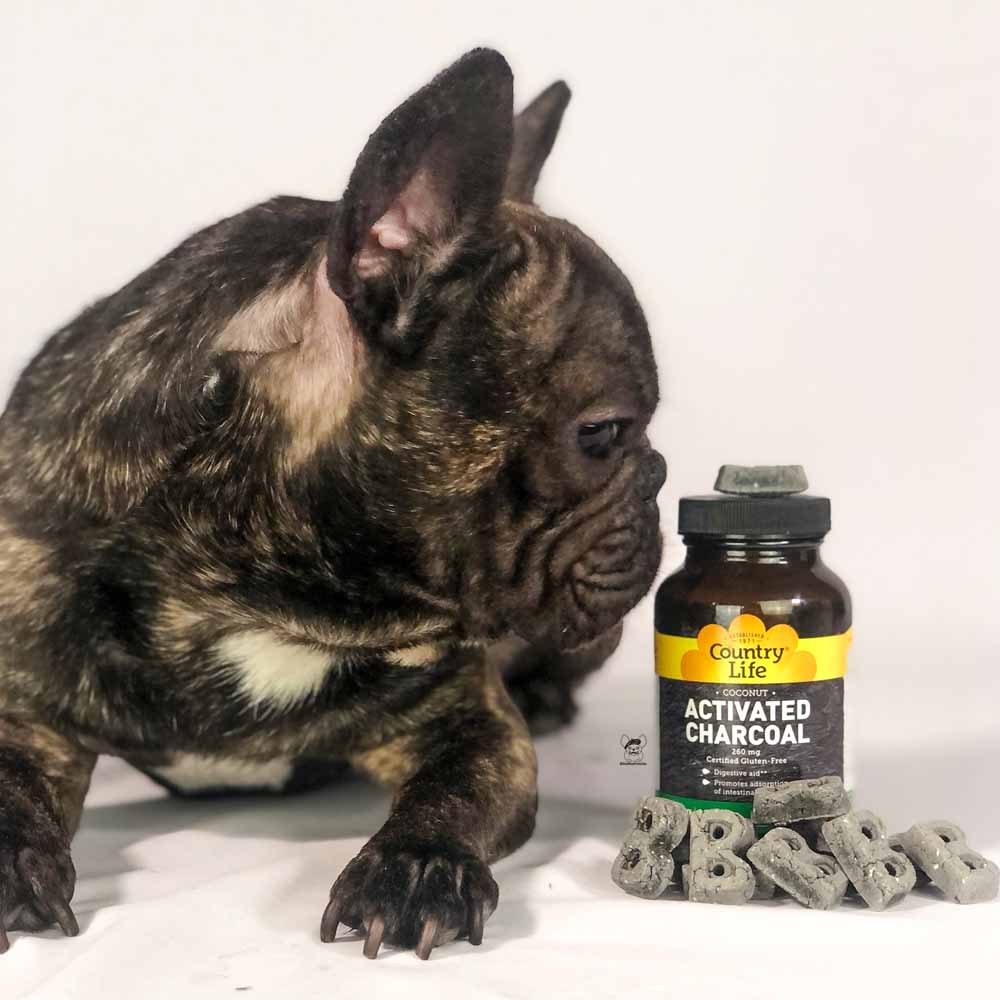When it comes to keeping our furry friends healthy and happy, we often seek natural remedies that can address various health concerns. One such remedy gaining popularity is activated charcoal for dogs. This black powder has been used for centuries due to its impressive detoxification properties. Here, we will explore the benefits, usage, and safety considerations of activated charcoal for dogs. Let's dive in!

What is Activated Charcoal?
Activated charcoal, also known as activated carbon, is a form of carbon that has been processed to have small, low-volume pores. This unique structure enables it to trap and bind various substances, making it a powerful adsorbent. Activated charcoal is commonly made from sources like coconut shells or wood, which are heated to high temperatures, creating a porous surface that increases its adsorption capacity.
How Does Activated Charcoal Work?
Activated charcoal works through a process called adsorption. Unlike absorption, where substances are soaked up into another substance, adsorption involves the adhesion of molecules to the surface of the adsorbent material. The porous structure of activated charcoal allows it to attract and trap toxins, chemicals, and gases, preventing them from being absorbed by the body.
Benefits of Activated Charcoal for Dogs
The benefits of activated charcoal for dogs are numerous. Here are some key advantages:
1. Digestive Support
Activated charcoal can be beneficial for dogs experiencing digestive issues such as gas, bloating, or diarrhea. It helps by adsorbing harmful substances in the gastrointestinal tract, reducing discomfort, and promoting normal bowel movements. Additionally, activated charcoal can aid in alleviating bad breath caused by digestive disturbances.
2. Poisoning and Toxin Removal
One of the remarkable properties of activated charcoal is its ability to counteract poisoning and remove toxins from the body. In cases of accidental ingestion of harmful substances or toxins, administering activated charcoal to dogs can help prevent the absorption of these substances into the bloodstream. It acts as a "trap," binding the toxins and allowing them to be safely eliminated through the digestive system.
3. Odor Control
Activated charcoal can be used to address unpleasant odors in dogs. It can help reduce strong smells associated with flatulence, feces, or urine. By adsorbing odor-causing compounds, activated charcoal effectively neutralizes unpleasant smells, providing a fresher environment for both dogs and their owners.
4. Detoxification
Activated charcoal is a powerful detoxifying agent. When ingested, it binds to toxins and prevents their absorption in the digestive tract. This can be particularly beneficial if your happy dog has consumed something toxic or harmful, such as certain medications, chemicals, or even certain types of food within a dog food container product.
5. Allergy Relief
Dogs, like humans, can experience allergies. Activated charcoal can help alleviate allergy symptoms by adsorbing allergens and reducing the overall histamine response in the body. This can provide relief from itching, redness, and other allergy-related discomforts.
6. Oral Health
Activated charcoal's adsorptive properties make it an excellent natural remedy for maintaining good oral health in dogs. It can help remove plaque, tartar, and bacteria from the teeth and gums, reducing the risk of dental issues such as gum disease and tooth decay.
These benefits make activated charcoal a natural and effective remedy for various canine health concerns. However, it's important to follow recommended dosage instructions and consult with a veterinarian before using activated charcoal for your dog.
Administering Activated Charcoal to Dogs
Administering activated charcoal to good family dogs is a straightforward process. Here are some guidelines to follow:
1. Form: Activated charcoal for dogs is available in various forms, including capsules, powder, or mixed with food. Choose the form that is most convenient for you and your dog.
2. Dosage: It's crucial to follow the recommended dosage instructions provided by your veterinarian or the product manufacturer. The dosage usually depends on your dog's weight and the specific purpose of administering activated charcoal.
3. Separation from Medications: Administer activated charcoal separately from other medications or supplements. It can interfere with the absorption of medications, so it's best to give them at different times. Consult with your veterinarian for specific guidance based on your dog's medication regimen.
4. Mixing with Food: If you're using powdered activated charcoal or a product that can be mixed with food, you can sprinkle the recommended dose onto your dog's regular meal. Make sure to mix it well to ensure your dog consumes the entire dose.
5. Follow-up: Monitor your dog after administering activated charcoal. Observe any changes in their condition and consult with your veterinarian if necessary.

Remember, activated charcoal should not be used as a substitute for veterinary care in cases of severe poisoning or toxin exposure. If you suspect your dog has ingested something harmful, seek immediate veterinary attention. Your veterinarian will provide the necessary guidance and treatment for your dog's specific situation.
Safety Considerations
While activated charcoal is generally safe for dogs, there are a few safety considerations to keep in mind:
1. Consult with a Veterinarian: Before using activated charcoal for your dog, it's essential to consult with a veterinarian, especially if your dog has any pre-existing health conditions or is on medication. They can provide guidance specific to your dog's needs and ensure it is appropriate for them.
2. Use as Directed: Follow the recommended dosage instructions provided by your veterinarian or the product manufacturer. Using excessive amounts of activated charcoal can lead to complications or interfere with nutrient absorption.
3. Not a Substitute for Veterinary Care: Activated charcoal should not be used as a substitute for veterinary care in cases of severe poisoning or toxin exposure. Prompt veterinary attention is crucial in such situations to provide the appropriate treatment and care for your dog.
4. Monitoring and Observation: After administering activated charcoal, monitor your dog for any adverse reactions or changes in their condition. If you notice any concerning symptoms, contact your veterinarian for further guidance.
5. Storage and Accessibility: Keep activated charcoal products out of reach of pets and store them in a secure location. This will prevent accidental ingestion and ensure the product remains effective.
By following these safety considerations and working closely with your veterinarian, you can safely incorporate activated charcoal as a natural remedy for your dog's health needs.

How to Choose the Best Activated Charcoal for Dogs
When selecting activated charcoal for your dog, consider the following factors:
1. Look for Quality and Purity
Choose activated charcoal that is high in quality and purity. Look for products that are specifically labeled for pet use and have undergone testing for safety and efficacy.
2. Consider the Formulation
Activated charcoal for dogs is available in different forms such as powder, capsules, or tablets. Consider the preferred form for administration based on your dog's size, preferences, and ease of use.
3. Check for Added Ingredients
Some activated charcoal products may contain additional ingredients such as flavorings or binders. Ensure that these ingredients are safe for dogs and do not pose any potential risks or allergies.
4. Opt for Natural Sources
Choose activated charcoal derived from natural sources like coconut shells or wood. These sources are generally considered safer and more sustainable compared to coal-based activated charcoal.
5. Consult Your Veterinarian
Before introducing activated charcoal into your dog's diet or as a supplement, consult your veterinarian. They can provide personalized advice based on your dog's specific needs, health conditions, and any potential drug interactions.

Potential Side Effects
While activated charcoal is generally considered safe for dogs, there are some potential side effects to be aware of:
1. Constipation: In some cases, activated charcoal can cause constipation in dogs. This may manifest as difficulty in passing stools or infrequent bowel movements. If you notice any signs of constipation, consult your veterinarian for guidance.
2. Black Stools: Activated charcoal can cause stools to appear black or dark in color. This discoloration is a normal effect of the charcoal binding to toxins in the digestive system. However, if your dog experiences other symptoms or the black stools persist for an extended period, it's advisable to seek veterinary advice.
3. Dehydration: There is a slight risk of dehydration when using activated charcoal in dogs. This can occur if the dog does not consume enough water while taking the charcoal. Ensure that your dog has access to fresh water at all times and encourage them to drink adequately.
It's important to note that these side effects are relatively rare and usually mild. However, if you observe any concerning symptoms or your dog's condition worsens, discontinue the use of activated charcoal and consult your veterinarian.
Precautions and Consultation with a Veterinarian
To ensure the safe and effective use of activated charcoal for your dog, follow these precautions:
1. Consult Your Veterinarian: Before incorporating activated charcoal into your dog's routine or using it as a treatment, Easing fear at the vet. They will consider your dog's specific health condition, age, breed, and any potential drug interactions.
2. Follow Dosage Instructions: Adhere to the recommended dosage guidelines provided by your veterinarian or the product manufacturer. Avoid exceeding the recommended dosage as it may increase the risk of side effects.
3. Observe Your Dog: Monitor your dog's response to activated charcoal. Watch for any adverse reactions, changes in behavior, or worsening of symptoms. If you notice any concerning signs, contact your veterinarian for guidance.
4. Hydration: Ensure your dog has access to clean, fresh water at all times. Encourage them to drink water regularly, as activated charcoal can cause dehydration if not accompanied by adequate hydration.
5. Individual Considerations: Every dog is unique, so consider any individual factors that may affect the use of activated charcoal, such as underlying health conditions, medications, or allergies. Your veterinarian can provide personalized advice based on your dog's specific needs.
By following these precautions and consulting with your veterinarian, you can ensure the safe and appropriate use of activated charcoal for your dog.

FAQs
Here are some frequently asked questions about activated charcoal for dogs:
1. Is activated charcoal safe for all dogs?
· Activated charcoal is generally safe for dogs, but it's advisable to consult with a veterinarian before using it, especially if your dog has any pre-existing health conditions or is on medication. They can provide personalized guidance based on your dog's specific needs.
2. Can activated charcoal be used as a daily supplement?
· Activated charcoal is not recommended as a daily supplement unless specifically advised by a veterinarian. It is primarily used for occasional detoxification or in cases of poisoning or toxin ingestion.
3. How quickly does activated charcoal work?
· The effectiveness of activated charcoal depends on various factors, including the substance involved and the time elapsed since ingestion. It's best to contact a veterinarian immediately in cases of suspected poisoning or toxin ingestion for prompt evaluation and treatment.
4. Can activated charcoal interfere with medication?
· Yes, activated charcoal can interfere with the absorption of medications. It's crucial to administer it separately from other medications or supplements. Consult with a veterinarian for specific guidance based on your dog's medication regimen.
5. Where can I purchase activated charcoal for dogs?
· Activated charcoal for dogs is available in pet supply stores, online retailers, and some veterinary clinics. It's necessary to choose a reputable brand and ensure the product is specifically formulated for canine use.
6. Can activated charcoal be used as a preventive measure for poisoning?
Activated charcoal is not a preventive measure for poisoning. It should be used as a first aid treatment in emergencies only. If you suspect your dog has ingested a toxic substance, contact your veterinarian immediately.
7. Are there any side effects of using activated charcoal for dogs?
Activated charcoal is generally well-tolerated by dogs and has minimal side effects. However, in rare cases, it may cause constipation or black stools. If you notice any unusual symptoms or concerns after administering activated charcoal, consult your veterinarian.
8. Can activated charcoal be used long-term?
Activated charcoal is not typically used as a long-term supplement. It is primarily administered in acute situations or as a short-term treatment. Always follow your veterinarian's guidance regarding the appropriate duration of use.
Remember, it's always best to consult with a veterinarian for specific advice regarding your dog's health and the use of activated charcoal. They can provide the most accurate information based on your dog's individual needs and circumstances.
Conclusion
Activated charcoal can be a valuable addition to your dog's healthcare routine. From detoxification and digestive health to oral hygiene and allergy relief, this natural remedy offers numerous benefits. However, it is crucial to consult with your veterinarian before using activated charcoal and to follow their dosage and administration instructions. Remember, activated charcoal should never replace proper veterinary care, and in case of emergencies or suspected poisoning, immediate professional assistance is essential. Keep your furry friend happy and healthy by incorporating activated charcoal into their wellness regimen with the guidance of a veterinary professional.




